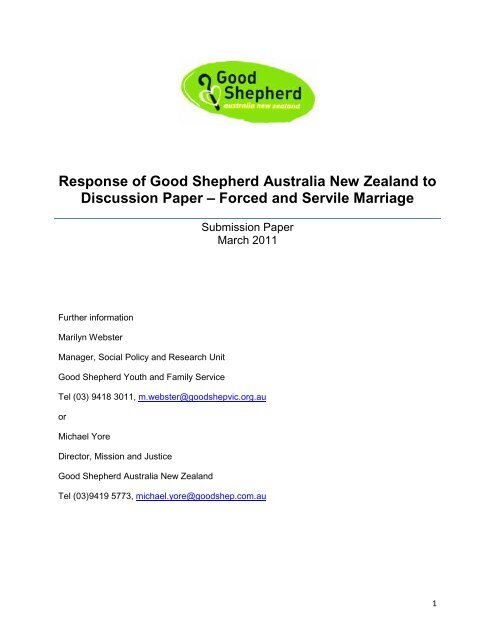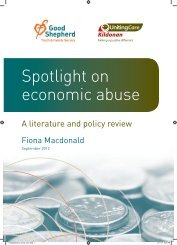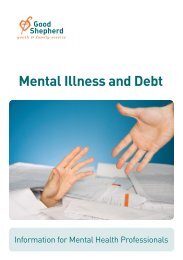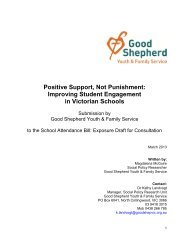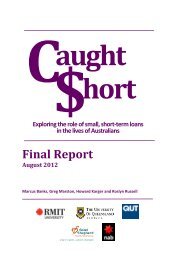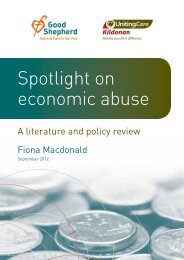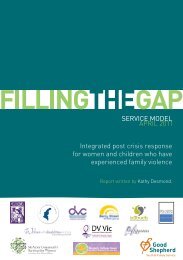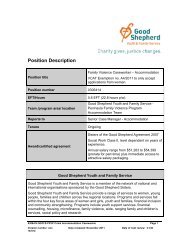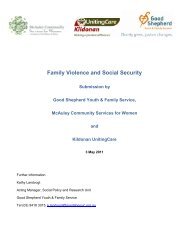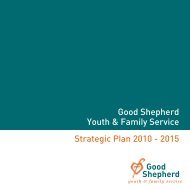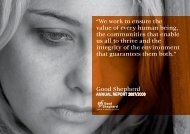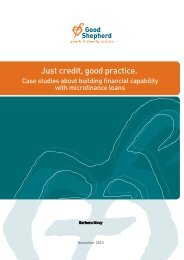Forced and Servile Marriage - Good Shepherd Youth & Family Service
Forced and Servile Marriage - Good Shepherd Youth & Family Service
Forced and Servile Marriage - Good Shepherd Youth & Family Service
Create successful ePaper yourself
Turn your PDF publications into a flip-book with our unique Google optimized e-Paper software.
Response of <strong>Good</strong> <strong>Shepherd</strong> Australia New Zeal<strong>and</strong> to<br />
Discussion Paper – <strong>Forced</strong> <strong>and</strong> <strong>Servile</strong> <strong>Marriage</strong><br />
Submission Paper<br />
March 2011<br />
Further information<br />
Marilyn Webster<br />
Manager, Social Policy <strong>and</strong> Research Unit<br />
<strong>Good</strong> <strong>Shepherd</strong> <strong>Youth</strong> <strong>and</strong> <strong>Family</strong> <strong>Service</strong><br />
Tel (03) 9418 3011, m.webster@goodshepvic.org.au<br />
or<br />
Michael Yore<br />
Director, Mission <strong>and</strong> Justice<br />
<strong>Good</strong> <strong>Shepherd</strong> Australia New Zeal<strong>and</strong><br />
Tel (03)9419 5773, michael.yore@goodshep.com.au<br />
1
Submission on <strong>Forced</strong> <strong>and</strong> <strong>Servile</strong> <strong>Marriage</strong><br />
3 March 2011<br />
2
1. Introduction <strong>and</strong> capacity to comment<br />
<strong>Good</strong> <strong>Shepherd</strong> Australia New Zeal<strong>and</strong> welcomes the opportunity to comment on the<br />
Discussion Paper on <strong>Forced</strong> <strong>and</strong> <strong>Servile</strong> <strong>Marriage</strong>. <strong>Good</strong> <strong>Shepherd</strong> Australia New Zeal<strong>and</strong> is<br />
the organisation managing the ministries <strong>and</strong> works of the Sisters of the <strong>Good</strong> <strong>Shepherd</strong> in<br />
Australia <strong>and</strong> New Zeal<strong>and</strong>, a Catholic order of nuns. Our mission is to promote a world of<br />
justice <strong>and</strong> peaceful co-existence, <strong>and</strong> to enable people of all cultural, religious <strong>and</strong> social<br />
backgrounds to enjoy the fullness of life that is the right of every human being.<br />
Each year we support tens of thous<strong>and</strong>s of women, families <strong>and</strong> young people across Australia<br />
<strong>and</strong> the Asia-Pacific region. Our top priority is a commitment to women <strong>and</strong> Indigenous persons<br />
as the most marginalised <strong>and</strong> economically disadvantaged groups in society. Within this service<br />
area we run programs for vulnerable women, children, refugees, Indigenous Australians,<br />
trafficking victims, <strong>and</strong> survivors of domestic violence. This practical experience enables us to<br />
comment on measures to ensure the centrality of the safety <strong>and</strong> wellbeing of women <strong>and</strong><br />
children in the administration of the law.<br />
We strongly believe both legislative <strong>and</strong> non-legislative measures are necessary to address the<br />
problem of forced <strong>and</strong> servile marriage in Australia. We believe that action is required across<br />
the continuum of prevention, intervention <strong>and</strong> postvention to support victims of forced <strong>and</strong><br />
servile marriage, <strong>and</strong> to deter such marriage practices in Australia. To that end, we believe the<br />
following principles should underpin proposed reform:<br />
1. Need for community engagement <strong>and</strong> education<br />
2. Additional immigration <strong>and</strong> emigration safeguards to prevent forced <strong>and</strong> servile marriage<br />
3. Systemic service provider coordination <strong>and</strong> training<br />
4. Obligation to identify <strong>and</strong> support women <strong>and</strong> children who are victims of forced <strong>and</strong><br />
servile marriage<br />
5. Civil penalties to empower <strong>and</strong> protect women <strong>and</strong> children<br />
6. Criminal penalties to deter <strong>and</strong> prosecute offenders.<br />
For the purposes of this submission <strong>Good</strong> <strong>Shepherd</strong> underst<strong>and</strong>s forced <strong>and</strong> servile marriages<br />
to be marriages entered into without the full <strong>and</strong> free consent of both partners. Arranged<br />
marriages are not forced marriages, as both partners <strong>and</strong> their families must agree to an<br />
arranged marriage. <strong>Servile</strong> marriages are a subset of forced marriages involving slavery-like<br />
Submission on <strong>Forced</strong> <strong>and</strong> <strong>Servile</strong> <strong>Marriage</strong><br />
3 March 2011<br />
3
marriage practices in which one partner, typically the woman, is treated like a chattal, in other<br />
words transferred, sold, or inherited.<br />
2. Overview of forced <strong>and</strong> servile marriage in Australia<br />
<strong>Forced</strong> <strong>and</strong> servile marriage is a human rights issue predominantly impacting women <strong>and</strong> girls.<br />
For example, the <strong>Forced</strong> <strong>Marriage</strong> Unit in the United Kingdom has found 85 percent of cases<br />
affect women <strong>and</strong> girls (Seal, 2009). A study in the United States indicated that half of recent<br />
immigrants cited increased domestic violence since emigrating (Anderson, 1993), <strong>and</strong> another<br />
found that abuse of married immigrant women was twice the national average (Stepnitz, 2009).<br />
Such marriages also mainly impact cultural, ethnic, <strong>and</strong> religious minorities in Australia.<br />
‘All manner of atrocities are going on under the name of culture. There’s a fine line<br />
between [servile] marriage <strong>and</strong> slavery.’ (Migrant Resource Centre Manager, 2011)<br />
It is important to keep culture, religion, <strong>and</strong> language in mind when considering the challenges<br />
facing victims <strong>and</strong> how best to ensure their human rights through systems of support.<br />
<strong>Forced</strong> <strong>and</strong> servile marriage affects thous<strong>and</strong>s in Australia<br />
<strong>Good</strong> <strong>Shepherd</strong> welcomes the Attorney-General’s Department discussion paper as the first step<br />
in government recognition that forced <strong>and</strong> servile marriage potentially impacts many women <strong>and</strong><br />
children in Australia <strong>and</strong> should be addressed. We suspect thous<strong>and</strong>s are affected by<br />
trafficking, slavery, <strong>and</strong> forced <strong>and</strong> servile marriage in Australia. One domestic violence<br />
professional in a specialist service for women from culturally diverse backgrounds said, ‘<strong>Forced</strong><br />
<strong>and</strong> servile marriage is our bread <strong>and</strong> butter. It affects 99 percent of the 800 women we work<br />
with each year.’ Immigrant battered women are also ‘highly represented in shelters, legal aid,<br />
<strong>and</strong> ethnic welfare services’ (Easteal, 1996). The following account illustrates some of these<br />
issues:<br />
‘The Australian husb<strong>and</strong> ran a farm, <strong>and</strong> met his Southeast Asian bride online. After she<br />
arrived, he had her working 18 hours a day, 7 days a week on the farm, while he drank<br />
<strong>and</strong> did drugs.’ (Immigrant Domestic Violence Professional, 2011)<br />
In the United Kingdom, nominal data <strong>and</strong> a few highly publicised incidents resulted in the<br />
enactment of the <strong>Forced</strong> <strong>Marriage</strong> Act in 2007. The Act created the <strong>Forced</strong> <strong>Marriage</strong> Unit (FMU)<br />
Submission on <strong>Forced</strong> <strong>and</strong> <strong>Servile</strong> <strong>Marriage</strong><br />
3 March 2011<br />
4
to work with embassy staff abroad to rescue victims, assist potential <strong>and</strong> actual victims in <strong>and</strong><br />
outside the UK, develop guidelines for <strong>and</strong> train professionals, <strong>and</strong> educate the public. In 2008<br />
the FMU assisted about 400 actual <strong>and</strong> potential victims, <strong>and</strong> by 2009 that number had<br />
quadrupled to more than 1600 (<strong>Forced</strong> <strong>Marriage</strong> Unit, 2011) with more than 5000 calls to the<br />
hotline (Seal 2009). A 2008 report indicated there are at least 3000 (Revill), <strong>and</strong> likely more<br />
than 5000 victims of forced marriages in Britain each year (Casciani, 2010). In 2009, the British<br />
government repatriated 300 victims, 40 percent under age 16 (Talwar, 2010). Similarly in<br />
Australia, a Migrant Resource Centre Manager in Tasmania affirms that, ‘[t]he law must<br />
recognise that this is going on here in Australia, now. It is hidden under the veil of culture <strong>and</strong><br />
will continue until prevented by law.’<br />
<strong>Good</strong> <strong>Shepherd</strong> recognises that forced <strong>and</strong> servile marriage potentially impacts thous<strong>and</strong>s of<br />
women <strong>and</strong> children in Australia <strong>and</strong> should be addressed.<br />
Human rights obligations<br />
‘Australia allowed these women to come, <strong>and</strong> must then take responsibility for them.’<br />
(Immigrant Domestic Violence Professional, 2011)<br />
Australia is under international obligation to criminalise servile marriage (Supplementary<br />
Convention, 1957), <strong>and</strong> has human rights obligations through the Universal Declaration of<br />
Human Rights <strong>and</strong> a myriad of treaties (See Appendix) to ensure that men <strong>and</strong> women ‘are<br />
entitled to equal rights as to marriage, during marriage <strong>and</strong> at its dissolution,’ <strong>and</strong> that marriage<br />
‘be entered into only with the free <strong>and</strong> full consent of the intending spouses’ (Universal<br />
Declaration, 1948). These obligations imply a strong need for both criminal <strong>and</strong> civil legislation,<br />
as well as education <strong>and</strong> service support measures.<br />
‘Two Sudanese women I know were taken at gunpoint at ages 13 <strong>and</strong> 14 by men in<br />
refugee camps in Kenya. They speak no English, <strong>and</strong> the men brought them into<br />
Australia as wives. They each have five children, because the men want the government<br />
payments. They’ve both been badly beaten, raped <strong>and</strong> abused by other men in the<br />
community, <strong>and</strong> after ten years are finally back in contact with their families in Africa.’<br />
(Migrant Resource Centre Manager, 2011)<br />
Submission on <strong>Forced</strong> <strong>and</strong> <strong>Servile</strong> <strong>Marriage</strong><br />
3 March 2011<br />
5
<strong>Good</strong> <strong>Shepherd</strong> recommends that the Australian Government is active in its commitment to<br />
supporting vulnerable members of our society confronting forced <strong>and</strong> servile marriage <strong>and</strong> that<br />
this commitment should include world best practice criminal <strong>and</strong> civil legislation.<br />
3. Suggested legislative reforms<br />
<strong>Good</strong> <strong>Shepherd</strong> underscores the importance of enacting both criminal <strong>and</strong> civil legislative<br />
reforms.<br />
‘Legislation is important. These issues slip under the radar.’ (Centre Against Sexual<br />
Assault Professional, 2011)<br />
‘Police are willing to intervene, but the only crime they can use is domestic violence.’<br />
(Migrant Resource Centre Manager, 2011)<br />
In addition to language, culture <strong>and</strong> other impediments, victims often face the daunting prospect<br />
of police reporting resulting in criminal charges against family <strong>and</strong> close community members.<br />
One professional who works with hundreds of victims of forced <strong>and</strong> servile marriage in Australia<br />
each year indicated only 1-2 percent of her clients would choose to pursue criminal charges,<br />
<strong>and</strong> if that were their only legal avenue, would choose to stay in the marriages (Immigrant<br />
Domestic Violence <strong>Service</strong>, 2011). The importance of civil legal remedies is evident in<br />
interviews with professionals who indicate that most women say, ‘I do not want to separate from<br />
my husb<strong>and</strong>. I want the violence to stop’ (Immigrant Domestic Violence Worker, 2011).<br />
The importance of criminal penalties <strong>and</strong> deterrence as well as civil provision is illustrated by the<br />
following story:<br />
‘A young Iraqi woman was sent here <strong>and</strong> forced to marry her first cousin. Her mother in<br />
law then made her to wash oily clothes from the family mechanic business, <strong>and</strong> clean<br />
<strong>and</strong> cook for a house of ten, even when her h<strong>and</strong>s were chapped <strong>and</strong> bleeding. She<br />
wasn’t allowed to leave the house. After working with us for 8 months to flee the<br />
marriage, her husb<strong>and</strong>’s family paid to send her back to Iraq. Her family in Iraq said if<br />
Submission on <strong>Forced</strong> <strong>and</strong> <strong>Servile</strong> <strong>Marriage</strong><br />
3 March 2011<br />
6
she didn’t return to her husb<strong>and</strong>, they’d kill her for the dishonour.’ (Immigrant Domestic<br />
Violence Worker, 2011)<br />
<strong>Good</strong> <strong>Shepherd</strong> believes empowering women with the choice to pursue civil <strong>and</strong> criminal<br />
avenues increases reporting <strong>and</strong> access to support for actual <strong>and</strong> potential victims.<br />
Encapsulating offences occurring in <strong>and</strong> outside Australia<br />
‘If a man lies <strong>and</strong> brings a woman over on a visa saying she is a sister or daughter, it’s<br />
almost impossible for her to prove marriage.’ (Immigrant Domestic Violence Worker,<br />
2011)<br />
From 2001 to 2007 the number of spouses <strong>and</strong> fiancées entering the country nearly doubled to<br />
30,000. In 2005, 3 percent of registered marriages were between Asian-born women <strong>and</strong><br />
Australian-born men (Brock, 2009). One study found that Filipina women in Australia between<br />
20 <strong>and</strong> 39 were 6 times more likely to be victims of homicide than Australian women. In<br />
addition, available information indicated no perpetrator was Filipino, <strong>and</strong> all but one perpetrator<br />
were married to or intimately involved with the victim (Schloenhardt, 2009).<br />
UNICEF estimates that 42 percent of girls in Africa are married before the age of 18, <strong>and</strong> that<br />
there is a clear link between Female Genital Mutilation <strong>and</strong> child marriages (Child <strong>Marriage</strong> <strong>and</strong><br />
<strong>Forced</strong> <strong>Marriage</strong>, 2011), illustrated in the following account:<br />
‘[In order to prepare girls for marriage] in many African cultures, preteen girls are being<br />
circumcised on ‘shopping trips’ from Tasmania to Melbourne. The only way to stop them<br />
is to tell families, ‘If you do this, you’ll be imprisoned.’ (Migrant Resource Centre<br />
Manager, 2011)<br />
Cross-cultural marriages may be cross-border, or may occur inside Australia. To promote safety<br />
of actual <strong>and</strong> potential victims of forced <strong>and</strong> servile marriage, to send a clear message that such<br />
marriages are absolutely prohibited in Australia, <strong>and</strong> to ensure compliance with treaty<br />
obligations (See Appendix) additional laws should be enacted.<br />
Submission on <strong>Forced</strong> <strong>and</strong> <strong>Servile</strong> <strong>Marriage</strong><br />
3 March 2011<br />
7
<strong>Good</strong> <strong>Shepherd</strong> believes specific criminal <strong>and</strong> civil offences for forced <strong>and</strong> servile marriage<br />
should capture:<br />
1. An offence occurring in Australia, <strong>and</strong><br />
2. An offence committed against an Australian citizen or resident outside Australia, <strong>and</strong><br />
3. An offence perpetrated by an Australian citizen or resident outside Australia.<br />
Defining forced <strong>and</strong> servile marriage broadly to include cultural <strong>and</strong> religious marriage<br />
We believe forced marriage should be defined broadly, consistent with international obligations<br />
as ‘any marriage entered into without full <strong>and</strong> free consent of both parties’ (cited in Discussion<br />
Paper Annexure 1, 2011). <strong>Servile</strong> marriage as defined in the Supplementary Convention Article<br />
1(c) is a limited <strong>and</strong> outdated definition (1957, quoted in Discussion Paper, 2011). To<br />
encapsulate cases of men <strong>and</strong> boys in forced <strong>and</strong> servile marriage (Hill, 2010), as well as<br />
children, we believe servile marriage should be defined as any institution or practice whereby:<br />
1. A person, without the right to refuse, is promised or given in marriage on payment of a<br />
consideration in money or in kind to her parents, guardian, family or any other person or<br />
group; or<br />
2. The spouse of a person, their family, or their clan, has the right to transfer their spouse<br />
to another person for value received or otherwise; or<br />
3. A person on the death of their spouse is liable to be inherited by another person; <strong>and</strong><br />
4. The person may be a child; <strong>and</strong><br />
5. The person may be male or female.<br />
We further recommend the definition of marriage be broadened in laws regarding forced <strong>and</strong><br />
servile marriage to encompass religious <strong>and</strong> cultural marriages. For example, de facto marriage<br />
‘does not cover cultures where men <strong>and</strong> women have separate sleeping quarters in community<br />
compounds,’ <strong>and</strong> ‘marriage is not always an exclusive relationship’ (Migrant Resource Centre,<br />
2011).<br />
Submission on <strong>Forced</strong> <strong>and</strong> <strong>Servile</strong> <strong>Marriage</strong><br />
3 March 2011<br />
8
‘In many cultural marriage ceremonies, families exchange dowries before girls are even<br />
14. We have cases of the girl’s family in Australia pinning her down while the new<br />
husb<strong>and</strong> rapes her to seal the deal. She continues to live with her family until she’s 18,<br />
but is sent over to the man when he wants sex. The marriages are rarely registered <strong>and</strong><br />
very hard to prove.’ (Migrant Resource Centre, 2011)<br />
One suggestion so that new legislation captures victims of cultural <strong>and</strong> religious forced <strong>and</strong><br />
servile marriages is the following 3-part test: (1) one or both partners self-identify as married,<br />
<strong>and</strong> (2) religious or ethnic community members recognise the marriage, <strong>and</strong> (3) marriage is<br />
binding within the cultural <strong>and</strong> religious beliefs (Migrant Resource Centre, 2011). Eminent<br />
anthropologist Edvard Westermarck defined marriage as a relation of at least two people ‘that is<br />
recognised by custom or law’ (Westermarck, 1936). The <strong>Forced</strong> <strong>Marriage</strong> Act in the United<br />
Kingdom defines marriage as ‘any religious or civil ceremony (whether or not legally binding)’<br />
(2007).<br />
We believe a broadened definition of marriage in the forced <strong>and</strong> servile marriage context<br />
encompassing cultural <strong>and</strong> religious marriages would enhance enforcement of new laws.<br />
Creating a specific criminal offence of forced marriage<br />
Amendment to existing code definitions of slavery could hinder enforcement <strong>and</strong> confuse<br />
jurisprudence. As Chief Justice Gleeson of Victoria said in R v Wei Tang: ‘It is important not to<br />
debase the currency of language, or to banalise crimes against humanity, by giving slavery a<br />
meaning that extends beyond the limits set by the text, context, <strong>and</strong> purpose of the 1926<br />
Slavery Convention.’ Similarly, amending the <strong>Marriage</strong> Act would be too limiting in application of<br />
the criminal offence, because it would not allow for a broad definition of forced <strong>and</strong> servile<br />
marriage that would encompass religious <strong>and</strong> cultural marriages.<br />
‘In Queensl<strong>and</strong> I saw many cases of Australian men bringing over Southeast Asian<br />
wives, <strong>and</strong> then offering them up to their mates to rape <strong>and</strong> sexually abuse. Then they<br />
would videotape it <strong>and</strong> use the tapes to blackmail their wives.’ (Immigrant Domestic<br />
Violence Professional, 2011)<br />
Submission on <strong>Forced</strong> <strong>and</strong> <strong>Servile</strong> <strong>Marriage</strong><br />
3 March 2011<br />
9
‘A Thai woman’s family sent her to Australia to marry. Her mother in law made her work<br />
in the basement making jewellery for a family shop. The husb<strong>and</strong> refused to divorce her,<br />
<strong>and</strong> neighbours didn’t even know the woman was there until the jewellery business failed<br />
<strong>and</strong> they were evicted.’ (Migrant Resource Centre Manager, 2011)<br />
A separate offence is also in conformity with the amended separate offence of debt bondage<br />
<strong>and</strong> the new offences enacted in the federal Sexual Offences Against Children Bill (2010). A<br />
separate offence criminalising forced <strong>and</strong> servile marriages <strong>and</strong> utilising a broad definition of<br />
marriage could be enacted as Division 274 <strong>Forced</strong> <strong>and</strong> <strong>Servile</strong> <strong>Marriage</strong> (Australia Criminal<br />
Code Act, Ch. 8, 1995). New offences could include: forced marriage, servile marriage,<br />
aggravated forced marriage for children under 18, <strong>and</strong> aggravated servile marriage for children<br />
under 18.<br />
<strong>Good</strong> <strong>Shepherd</strong> believes it is important to enact a separate offence of forced <strong>and</strong> servile<br />
marriage that addresses the behaviour of those who orchestrate, or aid <strong>and</strong> abet, or profit from<br />
such marriages.<br />
Extending civil protection orders <strong>and</strong> introducing injunctive measures<br />
Courts in Australia have utilised a civil protection order <strong>and</strong> an interim injunction to protect<br />
underage girls from being taken outside of Australia in order to prevent forced marriages (cited<br />
in Discussion Paper). There is currently no such protection for adults above the age of 18,<br />
whether potential or actual victims of forced or servile marriage.<br />
Through the <strong>Forced</strong> <strong>Marriage</strong> Act in the United Kingdom the courts have made 36 forced<br />
marriage prevention orders to prevent people from being taken abroad against their will<br />
(Casciani, 2010). In addition to language, culture <strong>and</strong> other access impediments to reporting,<br />
victims face the daunting prospect of their reporting resulting in criminal charges against their<br />
own family members <strong>and</strong> close-knit community.<br />
‘[Underage] girls are often brought overseas on holiday by their families, especially my<br />
clients from Turkey <strong>and</strong> the Middle East, <strong>and</strong> forced to marry older men or cousins to<br />
Submission on <strong>Forced</strong> <strong>and</strong> <strong>Servile</strong> <strong>Marriage</strong><br />
3 March 2011<br />
10
ing the men to Australia <strong>and</strong> keep wealth within the family.’ (Immigrant Domestic<br />
Violence Worker, 2011)<br />
<strong>Good</strong> <strong>Shepherd</strong> believes by extending interim injunction measures <strong>and</strong> civil protection orders to<br />
adults, victims can feel more empowered to report, <strong>and</strong> not be concerned with criminal<br />
consequences further complicating their difficult lives.<br />
Safeguarding international marriages through increased regulation<br />
‘A Chinese man sponsored a wife from China, <strong>and</strong> when the woman arrived she realised<br />
the man’s mother, not her husb<strong>and</strong>, had been in contact with her, because he was<br />
severely disabled <strong>and</strong> the mother wanted a new full-time caretaker.’ (Immigrant<br />
Domestic Violence Professional, 2011)<br />
Over 42,000 visas were granted for partners to enter Australia in 2008-09 (Schloenhardt 2009).<br />
Many of these partners met through international marriage brokering agencies, mostly operating<br />
on the internet. Victoria <strong>and</strong> Queensl<strong>and</strong> have enacted specific legislation regulating marriage<br />
brokering, ‘<strong>and</strong> both states focus on protecting consumers’ (Immigrant Domestic Violence<br />
Professional, 2011). That such legislation was enacted is indicative of the problem. For<br />
example, it was estimated that in 1994 the marriage brokering industry in Victoria alone had a<br />
turnover of more than $12 million, <strong>and</strong> 82 percent of the registered complaints concerned only<br />
15 agencies (Introduction Agents Bill, 1997). Further, ‘there were no defined st<strong>and</strong>ards of<br />
service within the industry, nor were there appropriate information disclosure mechanisms’<br />
(Immigrant Domestic Violence Professional, 2011).<br />
‘Men often have a history of domestic violence with previous partners. I’ve personally<br />
encountered five women brought over by the same man on fiancée visas.’ (Migrant<br />
Resource Centre Manager, 2011)<br />
It is of further concern that many websites perpetuate dangerous servile stereotypes.<br />
Russianbrides.com.au states that ‘Russian women expect their man to be the head of the<br />
family. Over–independence <strong>and</strong> feminism have not spoiled their belief in traditional family<br />
values’ (2011). Elenasmodels.com claims, ‘Russian wives are more tolerant <strong>and</strong><br />
Submission on <strong>Forced</strong> <strong>and</strong> <strong>Servile</strong> <strong>Marriage</strong><br />
3 March 2011<br />
11
accommodating, more loyal <strong>and</strong> generally value their families more’ (Why Russian Women<br />
Make <strong>Good</strong> Wives, 2010). Another website claims, ‘Unless [Asian girls] are able to marry a<br />
western man, they know all to well that their future is bleak. Asian girls are very passive <strong>and</strong><br />
polite, they possess charm <strong>and</strong> are extremely attentive to their husb<strong>and</strong>’ (Asian Wife, 2009).<br />
After being told about a 22-year-old Russian student bashed to death in her home in Sydney's<br />
West by her 64-year-old Australian husb<strong>and</strong>, the owner of Russianbrides.com.au admitted that<br />
some of his clients might end up in abusive marriages, but insisted that ‘is a private matter,’ <strong>and</strong><br />
‘not something he can or should control’ (From Russia with Love, 2004).<br />
Several sites offer so-called psychological tests in which a potential bride must rate her level of<br />
agreement with statements such as:<br />
I don’t interfere in anything, I prefer the role of a detached on-looker.<br />
Discipline is not a burden, I try to fulfill requests exactly <strong>and</strong> in specified time.<br />
It is not a chore to regularly polish shoes.<br />
Feeling sorry for yourself is a sin!<br />
A real man remains a sexual hunter anywhere.<br />
A person’s intimate life is not subject to social st<strong>and</strong>ards.<br />
(Stepnitz, 2009).<br />
Research in the United States indicates that a significant number of mail-order bride agencies<br />
are connected to commercial sex trafficking <strong>and</strong> pornography (Stepnitz, 2009). Further, a<br />
Canadian study found the majority of husb<strong>and</strong>s of Filipina mail-order brides were ‘between the<br />
ages of 40 <strong>and</strong> 60, previously married, living in rural areas <strong>and</strong> maintaining antiquated ideals of<br />
marriage’ (Canada: The New Frontier, 2000). Isolation, lack of access to services, <strong>and</strong> the risk<br />
of domestic violence to women in rural areas is higher than in urban areas of Australia (The<br />
Right to be Safe, 2006). Another study found that women brought to Australia to marry within<br />
their culture were particularly vulnerable to abusive behavior perpetrated both by the husb<strong>and</strong><br />
<strong>and</strong> his extended family (Easteal, 1996). One Turkish bride reported:<br />
Submission on <strong>Forced</strong> <strong>and</strong> <strong>Servile</strong> <strong>Marriage</strong><br />
3 March 2011<br />
12
‘My husb<strong>and</strong>’s family implemented this curfew on me. They made everything so difficult.<br />
I wasn’t allowed to listen to radio, watch television or video. They didn’t do any shopping.<br />
[I was] hungry for days. They kept me in total isolation.’ (Easteal, 1996)<br />
A Migrant Resource Centre Manager interviewed for this submission stated that it was important<br />
for immigration officials to, ‘Keep an eye on employers who bring over a lot of women on work<br />
visas. They often keep them as wives, slaves or forced labour, <strong>and</strong> tell them if they speak up<br />
they’ll be arrested’ (2011). To address similar concerns, in 2005 the United States amended the<br />
Violence Against Women Act to regulate international marriage brokering (International Mail<br />
Order Bride Enforcement Act, or IMBRA). The Act:<br />
(1) Requires the broker do the following before contact information can be exchanged:<br />
a. Send a foreign national client the following information about a United States<br />
client:<br />
i. Sex offender registry records, any national, state or local arrest records,<br />
temporary or permanent civil protection or restraining orders, engagement<br />
in prostitution services, marital history records, ages of client’s children<br />
under 18, <strong>and</strong> a client affidavit;<br />
ii. All information must be in the foreign national’s primary language; <strong>and</strong><br />
b. Send a foreign national client a government-prepared pamphlet of legal rights<br />
<strong>and</strong> resources available to United States immigrant victims of domestic violence<br />
<strong>and</strong> other crimes; <strong>and</strong><br />
c. Obtain a foreign national client’s signed, written consent that the foreign national<br />
client has received the above information <strong>and</strong> authorises releasing contact<br />
information to the United States client;<br />
(2) Defines ‘international marriage broker’ as an entity based in or outside the United States<br />
that charges fees for providing matchmaking services or social referrals between United<br />
States citizens or permanent residents <strong>and</strong> foreign nationals;<br />
(3) Ensures compliance through:<br />
a. Specific criminal offence for misuse of information with a penalty of a fine <strong>and</strong> up<br />
to 1 year imprisonment;<br />
b. Specific civil penalties of not less than $5000 <strong>and</strong> not more than $25000 for<br />
reach violation;<br />
Submission on <strong>Forced</strong> <strong>and</strong> <strong>Servile</strong> <strong>Marriage</strong><br />
3 March 2011<br />
13
(4) Excepts nonprofit ‘traditional matchmaking organisation[s] of a cultural or religious<br />
nature’ <strong>and</strong> dating services whose principal business is not international.<br />
Recommendations in Canada (Canada: the New Frontier, 2000) <strong>and</strong> the United Kingdom<br />
suggest enactment of a similar law there, because ‘consumer husb<strong>and</strong>s hold all the power in<br />
the marriage transaction <strong>and</strong> dem<strong>and</strong> that they are happy with the terms of their purchase’<br />
(Stepnitz, 2009).<br />
‘I have seen Australian men marry Thai women there, <strong>and</strong> then force them into<br />
prostitution when they bring them back here to Victoria.’ (Domestic Violence<br />
Professional, 2011)<br />
Current Australian immigration policy requires an immigrant to have a clear criminal background<br />
check, psychological report <strong>and</strong> character test (Brock, 2009). An Immigrant Domestic Violence<br />
Worker reported, ‘We had a client whose fiancée abused her, <strong>and</strong> she was the fifth woman he<br />
had taken into Australia on a fiancée visa who then reported abuse’ (2011). Professionals in<br />
Australia working with domestic violence victims ask why the sponsoring men are not required<br />
to reciprocally undergo the same checks <strong>and</strong> send the information to their potential partners<br />
(Immigrant Domestic Violence Professional 2011). Both sponsors <strong>and</strong> potential partners<br />
deserve complete explanations of the rights <strong>and</strong> expectations in marriage in Australia, legal<br />
definitions <strong>and</strong> consequences of forced <strong>and</strong> servile marriage, trafficking, domestic violence <strong>and</strong><br />
other related crimes, <strong>and</strong> an increased peace of mind in the background <strong>and</strong> character of one<br />
another.<br />
Australia has demonstrated a commitment to abused immigrant brides by altering immigration<br />
policy for domestic violence victims to allow them to stay in the country if they are abused on a<br />
conditional visa. However, ‘The women can stay but they cannot work for sometimes 2-8 years,<br />
there’s not enough housing, no child care, <strong>and</strong> their communities often ostracise them. How<br />
they’re surviving no-one knows’ (Immigrant Domestic Violence Professional, 2011). Enacting<br />
legislation <strong>and</strong>/or reforming immigration policy would further Australia’s demonstrated<br />
commitment to protecting these victims, <strong>and</strong> also prevent potential perpetrators to sponsoring<br />
partners by creating a more effective filter. The majority of the cost would be placed on mailorder<br />
consumers <strong>and</strong> brokerages, as the government would only need to periodically ensure<br />
brokers are in compliance.<br />
Submission on <strong>Forced</strong> <strong>and</strong> <strong>Servile</strong> <strong>Marriage</strong><br />
3 March 2011<br />
14
<strong>Good</strong> <strong>Shepherd</strong> believes Federal regulation of international marriage brokering, <strong>and</strong> equalising<br />
background, psychological <strong>and</strong> character assessment requirements for both marriage <strong>and</strong><br />
fiancé visa sponsors <strong>and</strong> immigrants are key preventive mechanisms to reduce the incidence of<br />
forced <strong>and</strong> servile marriage in Australia.<br />
Proposed elements of new <strong>and</strong> amended laws<br />
<strong>Good</strong> <strong>Shepherd</strong> believes that the following legislative changes should be considered:<br />
(1) Enact a specific offence to criminalise the conduct of a person who causes a victim to<br />
enter a forced or servile marriage;<br />
(a) With broad <strong>and</strong> separate definitions of forced <strong>and</strong> servile marriage capturing<br />
offences occurring in <strong>and</strong> outside Australia as outlined above;<br />
(b) <strong>Servile</strong> marriage be proven by conditions of the marriage;<br />
(c) Could be codified as Australia Criminal Code 1995, Chapter 8, Division 274<br />
(2) Include a fault element of intent, or knowledge or recklessness of a person bringing<br />
about a forced or servile marriage;<br />
(3) Encompass cases in which:<br />
(a) Victim consent was obtained through coercion, duress, deception or fraud;<br />
(b) Victim was incapable of consenting due to incapacity, natural or induced;<br />
(c) The marriage did not take place;<br />
(4) Be consistent with the existing offence of sexual servitude (section 270.6) in the Criminal<br />
Code to include a penalty up to 15 years imprisonment;<br />
(5) Include aggravated offences for victims under 18;<br />
(a) With a fault element of intent, or knowledge or recklessness of a victim’s age;<br />
(b) Be consistent with the existing offence of sexual servitude (section 270.6) in the<br />
Criminal Code to include a penalty up to 20 years’ imprisonment;<br />
(6) Criminalise the failure of international marriage brokers to conduct due diligence duties<br />
<strong>and</strong> disclosures;<br />
(7) Include civil penalties for international marriage broker misuse of information <strong>and</strong> failure<br />
to conduct due diligence duties <strong>and</strong> disclosures with fines;<br />
(a) Could include a shorter criminal imprisonment penalty, possibly up to 2 years;<br />
Submission on <strong>Forced</strong> <strong>and</strong> <strong>Servile</strong> <strong>Marriage</strong><br />
3 March 2011<br />
15
(8) Include civil remedies for victims from a person with intent or knowledge or recklessness<br />
in bringing about a forced or servile marriage;<br />
(9) Include an extension of the <strong>Marriage</strong> Act to allow for injunctive measures <strong>and</strong> protection<br />
orders for actual <strong>and</strong> potential victims of forced or servile marriage.<br />
<strong>Good</strong> <strong>Shepherd</strong> emphasises the importance of enacting both civil <strong>and</strong> criminal legislation<br />
utilising a broad definition of marriage, encompassing acts in <strong>and</strong> outside Australia, <strong>and</strong> of<br />
policies that prevent forced <strong>and</strong> servile marriage as well as support victims <strong>and</strong> deter potential<br />
offenders.<br />
4. Suggested non-legislative reforms<br />
The <strong>Forced</strong> <strong>Marriage</strong> Unit in the United Kingdom has created general <strong>and</strong> specific guidelines for<br />
professionals to recognise <strong>and</strong> support actual <strong>and</strong> potential victims of forced <strong>and</strong> servile<br />
marriage, including the fields of law enforcement, education, social work, medical, <strong>and</strong> political<br />
professionals (Multi-agency Practice Guidelines, 2011). These guidelines are closely aligned<br />
with recommendations in Australian studies of Aboriginal persons, immigrants <strong>and</strong> family<br />
violence. For example, a 2006 study by the Social Justice Commissioner of Australia suggested<br />
increased government funding <strong>and</strong> support for:<br />
(1) Community engagement <strong>and</strong> human rights education;<br />
(2) Working with men to promote prevention;<br />
(3) Increased access to counselling <strong>and</strong> mental health support, <strong>and</strong> to shelters <strong>and</strong> refuges;<br />
(4) Educating professionals on indicators of potentially harmful behaviours <strong>and</strong> victims<br />
identification;<br />
(5) Recognising government accountability <strong>and</strong> responsibility for vulnerable potential <strong>and</strong><br />
actual victims<br />
(Ending <strong>Family</strong> Violence, 2006).<br />
<strong>Good</strong> <strong>Shepherd</strong> supports these recommendations being adapted for victims of forced <strong>and</strong><br />
servile marriage, <strong>and</strong> supports ‘providing comprehensive <strong>and</strong> culturally appropriate services’ to<br />
victims of forced <strong>and</strong> servile marriage (HumanTrafficking.Org, 2006).<br />
Submission on <strong>Forced</strong> <strong>and</strong> <strong>Servile</strong> <strong>Marriage</strong><br />
3 March 2011<br />
16
<strong>Service</strong> provider education <strong>and</strong> multiculturalism<br />
‘<strong>Service</strong> providers need better training so they can identify family violence, which is often<br />
indicative of forced <strong>and</strong> servile marriage, on the spot. In most cases we get, the police<br />
have been in the home many times <strong>and</strong> done nothing.’ (Immigrant Domestic Violence<br />
Worker, 2011)<br />
Recognising warning signs unique to victims of forced <strong>and</strong> servile marriage requires improved<br />
multicultural underst<strong>and</strong>ing among services. One method to address this is increased hiring of<br />
multilingual <strong>and</strong> multicultural workers. Further it must be considered that immigrant workers<br />
may need support through their induction into Australian workplace culture. Suggestions in a<br />
Victorian study of rural immigrant domestic violence victims similarly recommended that staff<br />
recruitment, training <strong>and</strong> networking have ‘multicultural diversity in mind’ (The Right to be Safe,<br />
2006).<br />
‘A 12-year-old African girl had an ectopic pregnancy. Her husb<strong>and</strong> brought her to the<br />
doctor <strong>and</strong> said he was her uncle, <strong>and</strong> the doctors <strong>and</strong> nurses didn’t even ask her a<br />
single question. Girls in that culture are not sexually active [by choice] at that age!’<br />
(Migrant Resource Centre Worker, 2011)<br />
Another method of improving multicultural education is through training of service providers,<br />
including immigration officials, police, social workers, doctors <strong>and</strong> nurses, teachers, <strong>and</strong><br />
politicians conducted by ethno-specialised service providers <strong>and</strong> non-governmental<br />
organisations. Further, there is currently no education on forced <strong>and</strong> servile marriage for<br />
registered marriage celebrants.<br />
<strong>Good</strong> <strong>Shepherd</strong> supports increased hiring of multicultural <strong>and</strong> multilingual service professionals,<br />
<strong>and</strong> careful consideration <strong>and</strong> collaboration with ethno-experts to engage in service provider<br />
multicultural training.<br />
Submission on <strong>Forced</strong> <strong>and</strong> <strong>Servile</strong> <strong>Marriage</strong><br />
3 March 2011<br />
17
<strong>Service</strong> provider coordination <strong>and</strong> funding<br />
‘We need more coordination between state agencies. Often because of isolation, women<br />
associate with communities who speak their own language, <strong>and</strong> if they move the men<br />
can find them again.’ (Migrant Resource Centre Manager, 2011)<br />
<strong>Forced</strong> <strong>and</strong> servile marriage cases are often identified by law enforcement <strong>and</strong> medical<br />
professionals through domestic violence issues, yet they may be unconnected with service<br />
providers <strong>and</strong> not know where to best refer victims. Complicated cases require multiple<br />
professionals working together to recognise specific cultural indicators of forced <strong>and</strong> servile<br />
marriage <strong>and</strong> balance competing safety concerns.<br />
Additionally, best practice policies to minimise victim story repetition <strong>and</strong> promote healing would<br />
help victims with immigration issues who are often re-traumatised through the constant<br />
repetition of their stories (Immigrant Resource Centre Professional, 2011). Current<br />
governmental policies for sexual crime victims do not consider coordination with immigration<br />
officials. Such coordination would not only support victims, but also improve information sharing<br />
<strong>and</strong> minimise repetitive <strong>and</strong> costly use of translators <strong>and</strong> interpreters.<br />
Further, if victims relocate within Australia or their native country, local law enforcement <strong>and</strong><br />
social workers should be enabled to support <strong>and</strong> protect them.<br />
<strong>Good</strong> <strong>Shepherd</strong> urges improved coordination <strong>and</strong> database sharing between law enforcement<br />
offices to give consistent support.<br />
Funding for services<br />
‘There was a strong message from women that they must work collectively [with the<br />
men]. Although many carry unresolved trauma <strong>and</strong> grief, inadequate counselling<br />
services [are] available. This not only compounds the stress experienced by individuals<br />
but also exacerbates the likelihood of violence. Due to isolation, poverty <strong>and</strong> the<br />
relatively small size of many Communities, innocent people cannot escape the violence<br />
Submission on <strong>Forced</strong> <strong>and</strong> <strong>Servile</strong> <strong>Marriage</strong><br />
3 March 2011<br />
18
as public transport <strong>and</strong> private vehicles are primarily nonexistent’ (Aboriginal <strong>and</strong> Torres<br />
Strait, 2000)<br />
This statement about Aboriginal persons, although relating to family violence, could just as<br />
easily apply to potential <strong>and</strong> actual victims of forced <strong>and</strong> servile marriage. While victims of<br />
forced <strong>and</strong> servile marriage are predominantly minorities <strong>and</strong> recent immigrants, some<br />
professionals suspect that forced marriages occurring within communities inside Australia are<br />
identified even less frequently than cross-border marriages, because of isolation <strong>and</strong> poverty.<br />
To illustrate the potential extent of forced <strong>and</strong> servile marriage through the amount of violence<br />
facing women <strong>and</strong> girls, it is estimated that 1 in 3 Australian women have experienced physical<br />
violence since the age of 15, <strong>and</strong> almost 1 in 5 have experienced sexual violence. In 2005, over<br />
350,000 women experienced physical violence <strong>and</strong> over 125,000 women experienced sexual<br />
violence inside Australia (National Plan, 2011).<br />
‘We have many a client who comes to Australia to get married, <strong>and</strong> after having sex the<br />
guy decides he doesn’t like the woman <strong>and</strong> says, ‘Go home.’ After a year or more<br />
arguing with immigration, the women often end up homeless.’ (Centre Against Sexual<br />
Assault Professional, 2011)<br />
One Migrant Resource Centre runs a childcare centre, <strong>and</strong> free programs to teach driving with<br />
local police officers as volunteers; both are highly successful at engaging <strong>and</strong> supporting actual<br />
<strong>and</strong> potential victims of forced <strong>and</strong> servile marriage in the community, <strong>and</strong> neither is funded<br />
(2011). Despite the marked success of ethno-specific services <strong>and</strong> non-governmental<br />
organisations, specialised providers bemoan competition for funding <strong>and</strong> numbers as reasons<br />
mainstream organisations do not refer cases on to them to better serve the victims with special<br />
needs (Immigrant Domestic Violence Worker, 2011). Professionals cite as necessary, but<br />
currently unfunded, the following supports:<br />
1. Interpreters for programs for men;<br />
2. Adequate space in refuges <strong>and</strong> shelters for victims <strong>and</strong> children;<br />
3. Adequate childcare <strong>and</strong> other services<br />
Visa restrictions on women working to support themselves <strong>and</strong> their children are also a barrier<br />
to recovery.<br />
Submission on <strong>Forced</strong> <strong>and</strong> <strong>Servile</strong> <strong>Marriage</strong><br />
3 March 2011<br />
19
<strong>Good</strong> <strong>Shepherd</strong> urges increased funding for services supporting victims of forced <strong>and</strong> servile<br />
marriage to demonstrate a strong commitment to human rights in Australia.<br />
Community engagement <strong>and</strong> education<br />
‘We hold information sessions on family <strong>and</strong> marriage law monthly in a community hall.<br />
They’re very well attended because we work with community leaders to organise <strong>and</strong><br />
advertise them. We don’t have any funding for them, though!’ (Migration Resource<br />
Centre Manager, 2011)<br />
‘You can tell the men ‘This is the case here,’ <strong>and</strong> they say their culture is different,<br />
despite signing statements on arrival that they’ll uphold the laws of Australia.’ (Migration<br />
Resource Centre Manager, 2011)<br />
Immigrants <strong>and</strong> refugees frequently do not underst<strong>and</strong> the legal implications of their actions,<br />
<strong>and</strong> are often unaware of their rights <strong>and</strong> responsibilities in marriage <strong>and</strong> family relationships.<br />
For example, it is reported that immigrant families routinely increase their daughters’ ages on<br />
documents, both in Australia <strong>and</strong> abroad (Immigrant Domestic Violence Worker, 2011).<br />
Immigrants may also not underst<strong>and</strong>, or find it culturally difficult to cooperate with, the Australian<br />
justice system. For example, using sexually explicit language as required in police reporting<br />
may be culturally prohibited <strong>and</strong> therefore unthinkable.<br />
In 2008 the British non-governmental organisation Karma Nirvana started a tour of schools <strong>and</strong><br />
community centres to draw attention to forced <strong>and</strong> servile marriage (Talwar, 2010). The first<br />
month of the tour, Karma Nirvana’s monthly call average doubled from 400 to nearly 800<br />
(Talwar, 2010). An Australian professional points out the importance of widespread community<br />
education <strong>and</strong> engagement to ensure that young women <strong>and</strong> men underst<strong>and</strong> the broader<br />
community rights <strong>and</strong> obligations which underpin marriage <strong>and</strong> family relationships in Australia<br />
(Centre Against Sexual Assault Professional, 2011). Another professional, however, offers a<br />
caution against targeting children with information on forced <strong>and</strong> servile marriage, because it<br />
could cause parents to take children out of school (Migrant Resource Centre Manager, 2011).<br />
Submission on <strong>Forced</strong> <strong>and</strong> <strong>Servile</strong> <strong>Marriage</strong><br />
3 March 2011<br />
20
A Victorian study of rural immigrant domestic violence victims, while developed to address the<br />
issue of domestic violence, may also suggest strategies for a community response to prevention<br />
<strong>and</strong> support of victims of forced <strong>and</strong> servile marriages. A community strategy requires that<br />
workers be involved in existing activity <strong>and</strong> education groups to build relationships of trust.<br />
Other recommendations are that:<br />
1. The need for workers to facilitate opportunities for both group <strong>and</strong> individual talking <strong>and</strong><br />
learning in a non-threatening context;<br />
2. The importance of collaboration between service providers, actual <strong>and</strong> potential victims,<br />
<strong>and</strong> decision makers;<br />
3. Multilingual printed <strong>and</strong> non-printed informational materials;<br />
4. Bilingual workers; <strong>and</strong><br />
5. Increased information about available services<br />
(The Right to be Safe, 2006).<br />
All of these suggestions are equally applicable to issues of forced <strong>and</strong> servile marriage. Building<br />
relationships takes time. ‘It’s one thing to give information, it’s another to challenge belief<br />
systems <strong>and</strong> a lifetime of experience.’ (Migrant Resource Centre Manager, 2011). Positive<br />
interactions with police, lawyers, doctors, <strong>and</strong> other service providers are important to break the<br />
barriers of negative stereotypes <strong>and</strong> distrust of authority <strong>and</strong> to build positive relationships<br />
between vulnerable communities <strong>and</strong> service providers.<br />
<strong>Good</strong> <strong>Shepherd</strong> recommends that the importance of community outreach in prevention as well<br />
as identification <strong>and</strong> support of victims of forced <strong>and</strong> servile marriage be acknowledged <strong>and</strong><br />
directly financially supported by the Australian Government.<br />
Research <strong>and</strong> data collection <strong>and</strong> periodic reviews<br />
As noted in the Discussion Paper, there is little direct research <strong>and</strong> data on the prevalence of<br />
forced <strong>and</strong> servile marriage in Australia. Research in the United Kingdom found in 2008 that<br />
more than 2000 students went missing from school registrars, a large number of whom are<br />
suspected to have been forced into underage marriages (Talwar, 2010). Similar research has<br />
not been conducted elsewhere in the world. The following quotes from professionals indicate to<br />
Submission on <strong>Forced</strong> <strong>and</strong> <strong>Servile</strong> <strong>Marriage</strong><br />
3 March 2011<br />
21
us that current knowledge is only the tip of the iceberg. Further study of the problem is needed<br />
so that the methods of addressing forced <strong>and</strong> servile marriage are improved:<br />
‘A Chinese woman started her own business, <strong>and</strong> her husb<strong>and</strong> put all the papers <strong>and</strong><br />
savings in his name. Then he held her captive <strong>and</strong> threatened to shame her <strong>and</strong> send<br />
her home because she was on a temporary spousal visa.’ (Migrant Resource Centre<br />
Worker, 2011)<br />
‘Many students end up supporting themselves in the sex industry, then meet a man who<br />
offers to sponsor them. One man said he would sponsor a young Malaysian woman on a<br />
fiancé visa, but instead got her a visitor’s visa <strong>and</strong> abused her <strong>and</strong> threatened to deport<br />
her.’ (Immigrant Domestic Violence Worker, 2011)<br />
‘Often women don’t believe they have a right because they are so battered <strong>and</strong><br />
disempowered, or culturally don’t have ownership over their own bodies. They don’t<br />
underst<strong>and</strong> the protection of Australian law.’ (Migrant Resource Centre Manager, 2011)<br />
<strong>Good</strong> <strong>Shepherd</strong> recommends that periodic research <strong>and</strong> review is needed to ensure any<br />
enacted measures are both preventing forced <strong>and</strong> servile marriage, adequately addressing<br />
problems, <strong>and</strong> are supporting the victims of forced <strong>and</strong> servile marriage.<br />
Submission on <strong>Forced</strong> <strong>and</strong> <strong>Servile</strong> <strong>Marriage</strong><br />
3 March 2011<br />
22
Appendix: Treaty Obligations<br />
‘<strong>Marriage</strong> shall be entered into only with the free <strong>and</strong> full consent of the intending spouses.”<br />
Universal Declaration of Human Rights, Article 16(2)<br />
‘No marriage shall be legally entered into without the full <strong>and</strong> free consent of both parties.”<br />
United Nations Convention on consent to marriage, minimum age for marriage <strong>and</strong> registration<br />
of marriages, Article 1<br />
‘No marriage shall be entered into without the free <strong>and</strong> full consent of the intending spouses.’<br />
International Covenant on Civil <strong>and</strong> Political Rights, Article 23(3)<br />
‘Children should be protected from all forms of sexual exploitation including unlawful sexual<br />
activity.’<br />
United Nations Convention on the Rights of the Child, Article 34<br />
‘States shall take measures to combat the illicit transfer <strong>and</strong> non-return of children abroad.’<br />
United Nations Convention on the Rights of the Child, Article 11(1)<br />
‘States shall render appropriate assistance to parents <strong>and</strong> legal guardians in the performance of<br />
their child-rearing responsibilities <strong>and</strong> shall ensure the development of institutions, facilities <strong>and</strong><br />
services for the care of children.’<br />
United Nations Convention on the Rights of the Child, Article 18(2)<br />
‘States shall take all appropriate legislative, administrative, social <strong>and</strong> educational measures to<br />
protect the child from all forms of physical or mental violence, injury or abuse, neglect or<br />
negligent treatment, maltreatment or exploitation, including sexual abuse.’<br />
United Nations Convention on the Rights of the Child, Article 19(1)<br />
Submission on <strong>Forced</strong> <strong>and</strong> <strong>Servile</strong> <strong>Marriage</strong><br />
3 March 2011<br />
23
‘A woman’s right to choose a spouse <strong>and</strong> enter freely into marriage is central to her life <strong>and</strong> her<br />
dignity <strong>and</strong> equality as a human being.’<br />
UN Convention on the Elimination of All Forms of Discrimination Against Women, General<br />
Recommendation No.21, Comment Article 16 (1)(b)<br />
‘Everyone…is [entitled] [t]he right to marriage <strong>and</strong> choice of spouse.’<br />
United Nations Convention on the Elimination of All Forms of Racial Discrimination, Article<br />
5(d)(iv)<br />
‘[A] State may refuse to recognize the validity of a marriage where…one of the spouses had not<br />
attained the minimum age required for marriage, or one of the spouses lacked the capacity to<br />
give their consent or did not freely consent to the marriage.’<br />
Hague Convention on Celebration <strong>and</strong> Recognition of Validity of <strong>Marriage</strong>s, Article 11 (3), (4)<br />
<strong>and</strong> (5)<br />
‘No migrant worker or member of his or her family shall be subjected to torture or to cruel,<br />
inhuman or degrading treatment or punishment.’<br />
United Nations Convention of the Rights of All Migrant Workers <strong>and</strong> Members of Their Families,<br />
Part III Article 10<br />
‘No migrant worker or member of his or her family shall be held in slavery or servitude. No<br />
migrant worker or member of his or her family shall be required to perform forced or compulsory<br />
labor.’<br />
United Nations Convention of the Rights of All Migrant Workers <strong>and</strong> Members of Their Families,<br />
Part III Article 11(1) <strong>and</strong> (2)<br />
‘States shall put in place…women- <strong>and</strong> child-focused legislation <strong>and</strong> policies, to ensure that<br />
Submission on <strong>Forced</strong> <strong>and</strong> <strong>Servile</strong> <strong>Marriage</strong><br />
3 March 2011<br />
24
instances of exploitation, violence <strong>and</strong> abuse against persons with disabilities are identified,<br />
investigated <strong>and</strong> prosecuted.’<br />
United Nations Convention on the Rights of Persons with Disabilities, Article 16(5)<br />
‘States shall take effective <strong>and</strong> appropriate measures to eliminate discrimination against<br />
persons with disabilities in all matters relating to marriage...so as to ensure that the right of all<br />
persons with disabilities who are of marriageable age to marry <strong>and</strong> to found a family on the<br />
basis of free <strong>and</strong> full consent of the intending spouses is recognized.’<br />
United Nations Convention on the Rights of Persons with Disabilities, Article 23(1)(a)<br />
Submission on <strong>Forced</strong> <strong>and</strong> <strong>Servile</strong> <strong>Marriage</strong><br />
3 March 2011<br />
25
References<br />
‘Aboriginal <strong>and</strong> Torres Strait Isl<strong>and</strong>er Women’s Task Force on Violence Report’ (2000) 5(2)<br />
Australian Indigenous Law Reporter 20, www.austlii.edu.au/au/journals/AILR/2000/20.html,<br />
accessed 10 February 2011.<br />
‘Asian Wife – Mail Order Brides Australia’ www.hookmeup.com.au/n-asian-wife-mail-orderbride-australia.aspx?id=377,<br />
accessed on 11 February 2011.<br />
Australian Government Attorney-General’s Department, Criminal Justice Division. ‘Discussion<br />
Paper <strong>Forced</strong> <strong>and</strong> <strong>Servile</strong> <strong>Marriage</strong>.’ (2010) www.ag.gov.au/forced<strong>and</strong>servilemarriage,<br />
accessed on 3 February 2011.<br />
Brock, Jane. (28 December 2009) ‘Border Control <strong>and</strong> Immigrant Brides in the Receiving<br />
Countries’ edm.iboninternational.org/component/content/article/378-globalization-issues/195-<br />
border-control-<strong>and</strong>-immigrant-brides-in-the-receiving-countries, accessed on 9 February 2011.<br />
Broude, Gwen <strong>and</strong> Greene, Sarah. (July 1983) ‘Cross-Cultural Codes on Husb<strong>and</strong>-Wife<br />
Relationships’ Ethnology Vol. 22, No. 3 pp. 263-280.<br />
‘Canada: The New Frontier for Filipino Mail-Order Brides’ (November 2000), Philippine Women<br />
Centre of B.C., Status of Women Canada, dsp-psd.pwgsc.gc.ca/Collection/SW21-62-2000E.pdf,<br />
accessed on 9 February 2011.<br />
Casciani, Dominic. (2 July 2010) ‘<strong>Forced</strong> <strong>Marriage</strong> Plea to Schools’ in BBC News,<br />
news.bbc.co.uk/2/hi/uk_news/8129466.stm, accessed on 7 February 2011.<br />
‘Child <strong>Marriage</strong> <strong>and</strong> <strong>Forced</strong> <strong>Marriage</strong>’ (2011) Forward: Safeguarding Rights <strong>and</strong> Dignity,<br />
www.forwarduk.org.uk/key-issues/child-marriage, accessed on 10 February 2011.<br />
Submission on <strong>Forced</strong> <strong>and</strong> <strong>Servile</strong> <strong>Marriage</strong><br />
3 March 2011<br />
26
Easteal, Patricia (1996) ‘Australian Institute of <strong>Family</strong> Studies <strong>Family</strong> Matters’ No. 45<br />
Spring/Summer, www.<br />
‘Ending <strong>Family</strong> Violence <strong>and</strong> Abuse in Aboriginal <strong>and</strong> Torres Strait Isl<strong>and</strong>er Communities – Key<br />
Issues, An Overview Paper of Research <strong>and</strong> Findings by the Human Rights Commission 2001-<br />
2006’ (June 2006) Social Justice Commissioner,<br />
www.humanrights.gov.au/social_justice/familyviolence/, accessed on 9 February 2011.<br />
‘<strong>Forced</strong> <strong>Marriage</strong> (Civil Protection) Act 2007’ (26 July 2007) Chapter 20, Part 4, N.I. 16,<br />
www.legislation.gov.uk/ukpga/2007/20/contents?view=plain, accessed on 10 February 2011.<br />
‘<strong>Forced</strong> <strong>Marriage</strong> Unit,’ United Kingdom Foreign <strong>and</strong> Commonwealth Office website. (2011)<br />
www.fco.gov.uk/en/travel-<strong>and</strong>-living-abroad/when-things-go-wrong/forced-marriage, accessed<br />
on 14 February 2011.<br />
‘From Russia with Love’ (18 February 2004) The Age,<br />
www.theage.com.au/articles/2004/02/17/1076779973893.html, accessed on 11 February 2011.<br />
Hill, Amelia <strong>and</strong> McVeigh, Karen ‘Gay Men Become Victims of <strong>Forced</strong> <strong>Marriage</strong>’ (1 July 2010) in<br />
‘The Guardian’ www.guardian.co.uk/world/2010/jul/01/gay-men-, accessed on 10 February<br />
2011.<br />
‘HumanTrafficking.Org: Australia’ (2006) http://www.humantrafficking.org/countries/australia,<br />
accessed on 10 February 2011.<br />
Immigrant Women's Domestic Violence <strong>Service</strong>, Victoria. (18 February 2011). Interviewed by:<br />
Valerie Gaimon<br />
Submission on <strong>Forced</strong> <strong>and</strong> <strong>Servile</strong> <strong>Marriage</strong><br />
3 March 2011<br />
27
‘International Mail Order Bride Enforcement Act’ (2005) 8 United States Code Sec. 1375a(d)(2)<br />
<strong>and</strong> (e)(4).<br />
‘Introduction Agents Bill Second Reading’ (17 December 1997) Victoria,<br />
tex.parliament.vic.gov.au/bin/texhtmlt?form=jVicHansard.dumpall&db=hansard91&dodraft=0&h<br />
ouse=ASSEMBLY&speech=18233&activity=Second+Reading&title=INTRODUCTION+AGENT<br />
S+BILL&date1=17&date2=September&date3=1997&query=true%0A%09<strong>and</strong>+%28+data+contai<br />
ns+%27Introduction%27%0A%09<strong>and</strong>+data+contains+%27Agents%27%0A%09<strong>and</strong>+data+conta<br />
ins+%27bill%27%0A%09<strong>and</strong>+data+contains+%27second%27%0A%09<strong>and</strong>+data+contains+%2<br />
7reading%27+%29%0A/, accessed on 23 February 2011.<br />
Migrant Resource Centre, Northern Tasmania. (9 February 2011). Interviewed by: Valerie<br />
Gaimon<br />
‘Multi-agency Practice Guidelines: H<strong>and</strong>ling Cases of <strong>Forced</strong> <strong>Marriage</strong>’ (June 2009) <strong>Forced</strong><br />
<strong>Marriage</strong> Unit, www.fco.gov.uk/forcedmarriage, accessed on 10 February 2011.<br />
‘National Plan to Reduce Violence Against Women <strong>and</strong> their Children’ (2011) Council of<br />
Australian Governments,<br />
www.fahcsia.gov.au/sa/women/progserv/violence/nationalplan/Documents/national_plan.pdf,<br />
accessed on 23 February 2011.<br />
Petrova, Elena. ‘Why Russian Women Make <strong>Good</strong> Brides?’ www.elenasmodels.com/russianwomen/why-russian-women-make-good-wives.htm,<br />
accessed 10 February 2011.<br />
R v Wei Tang (2009) VSCA 182, 39.<br />
Submission on <strong>Forced</strong> <strong>and</strong> <strong>Servile</strong> <strong>Marriage</strong><br />
3 March 2011<br />
28
Revill, Jo. (9 March 2008) ‘<strong>Forced</strong> marriage in UK 'a widespread problem' in The Observer,<br />
www.guardian.co.uk/world/2008/mar/09/gender.communities, accessed 9 February 2011.<br />
‘The Right to be Safe from Domestic Violence: Immigrant <strong>and</strong> Refugee Women in Rural Victoria’<br />
(May 2006) Immigrant Women’s Domestic Violence <strong>Service</strong>, www.iwdvs.org.au, accessed 10<br />
February 2011, citing Crime <strong>and</strong> Safety Survey, ABS 2003.<br />
‘Russian Brides’ (2011) www.russianbrides.com.au, accessed 10 February 2011.<br />
Schloenhardt, Andrea. (23 October 2009) ‘ ’Mail-Order Brides’ in Australia’ Human Trafficking<br />
Working Group, The University of Queensl<strong>and</strong> TC Beirne School of Law,<br />
www.law.uq.edu/humantrafficking, accessed on 9 February 2011.<br />
Seal, Rebecca <strong>and</strong> Wiseman, Eva. (11 January 2009) ‘Abducted. Abused. Raped. Survived.’ in<br />
The Guardian, www.guardian.co.uk/world/2009/jan/11/british-asian-forced-marriages, accessed<br />
10 February 2011.<br />
‘Sexual Offences Against Children Bill’ (2010) Commonwealth of Australia Crimes Legislation<br />
Amendment<br />
‘Slavery, Sexual Servitude <strong>and</strong> Deceptive Recruiting’ (1995) Commonwealth of Australia<br />
Criminal Code, Chapter 8, Division 270<br />
Southeastern Centre Against Sexual Assault, Victoria. (14 February 2011). Interviewed by:<br />
Valerie Gaimon<br />
Submission on <strong>Forced</strong> <strong>and</strong> <strong>Servile</strong> <strong>Marriage</strong><br />
3 March 2011<br />
29
Stepnitz, Abigail (2009) ‘Male-ordered: the Mail-order Bride Industry <strong>and</strong> Trafficking in Women<br />
for Sexual <strong>and</strong> Labour Exploitation’ The POPPY Project, Eaves Housing for Women,<br />
www.eaves4women.co.uk, accessed on 10 February 2011.<br />
‘Supplementary Convention on the Abolition of Slavery, the Slave Trade, <strong>and</strong> Institutions <strong>and</strong><br />
Practices Similar to Slavery.’ (30 April 1957) 226 U.N.T.S. 3.<br />
Talwar, Divya. (13 May 2010) ‘Roadshow Warning over <strong>Forced</strong> <strong>Marriage</strong>s to Start’ in BBC Asia<br />
Network, news.bbc.co.uk/2/hi/uk_news/8677442.stm, accessed 11 February 2011.<br />
‘Trafficking in Persons <strong>and</strong> Debt Bondage’ (1995) Commonwealth of Australia Criminal Code,<br />
Chapter 8, Division 271<br />
‘Universal Declaration of Human Rights.’ (1948) G.A. res. 217A (III), U.N. Doc A/810 p. 71.<br />
Anderson, Michelle. ‘A License to Abuse: the Impact of Conditional Status on Female<br />
Immigrants.’ (April 1993) The Yale Law Journal, Vol. 102, No. 6.<br />
Westermarck, Edward (1936) ‘The Future of <strong>Marriage</strong> in Western Civilization’<br />
Submission on <strong>Forced</strong> <strong>and</strong> <strong>Servile</strong> <strong>Marriage</strong><br />
3 March 2011<br />
30


